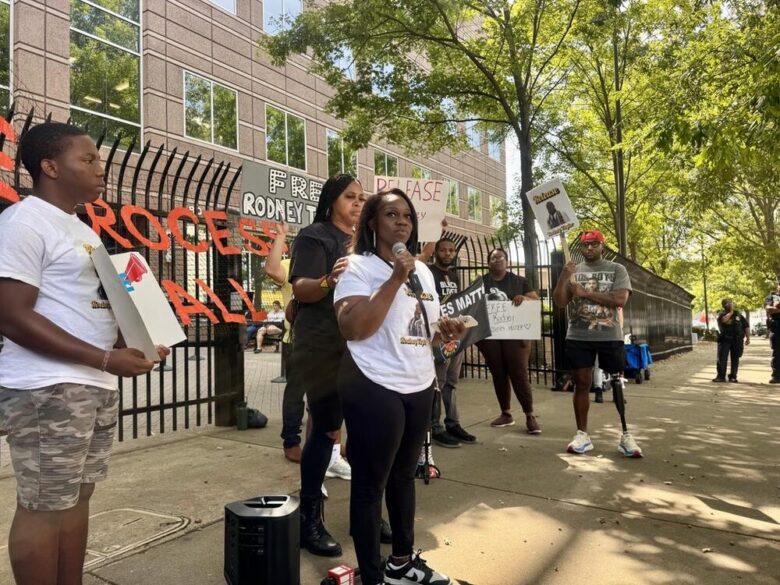Key Takeaways
- Supporters demand the release of Rodney Taylor, a disabled barber detained by ICE in Georgia.
- Taylor, a double amputee, has been in custody since January after arriving from Liberia as a child.
- His fiancée, Mildred Pierre, expresses gratitude for community support and highlights family unity during this crisis.
- Protests for Taylor’s release also occurred in Columbus, Georgia, showing widespread solidarity.
- Family claims he is not receiving adequate medical care in detention; ICE has not commented.
A group of supporters called for the release of Rodney Taylor, a disabled Georgia barber detained by federal immigration officials outside of the Atlanta Immigration and Customs Enforcement field office Friday.
Taylor has been in ICE custody at South Georgia’s Stewart detention center since January. The 46-year-old Atlanta-area barber and double amputee arrived in the U.S. from Liberia when he was 2 years old for medical care.
Mildred Pierre, Taylor’s fiancée, said their family is leaning on each other and praying for his release.
“We’re all affected, somewhere, somehow,” she said. “So it shows that, you know, there’s unity in this space. I feel like, you know, the support is overwhelming, and I’m grateful for everybody that took their time to be here.”
A similar protest also took place Friday in Columbus, Ga.
Taylor’s family says he is not receiving proper medical care in detention. A spokesperson for ICE did not respond to a request for comment.
This story comes to The Georgia Sun through a reporting partnership with GPB a non-profit newsroom focused on reporting in Georgia.
🛑 🛑 🛑
Before You Dismiss This Article…
We live in a time when information feels overwhelming, but here’s what hasn’t changed: facts exist whether they comfort us or not.
When A&W launched their third-pound burger to compete with McDonald’s Quarter Pounder in the 1980s, it failed spectacularly. Not because it tasted worse, but because customers thought 1/3 was smaller than 1/4. If basic math can trip us up, imagine how easily we can misread complex news.
The press isn’t against you when it reports something you don’t want to hear. Reporters are thermometers, not the fever itself. They’re telling you what verified sources are saying, not taking sides. Good reporting should challenge you — that’s literally the job.
Next time a story makes you angry, pause. Ask yourself: What evidence backs this up? Am I reacting with my brain or my gut? What would actually change my mind? And most importantly, am I assuming bias just because the story doesn’t match what I hoped to hear.
Smart readers choose verified information over their own comfort zone.

Sarah Kallis | GPB
Sarah Kallis is the Politics Reporter at GPB. She is also the capitol correspondent for GPB's Lawmakers.


